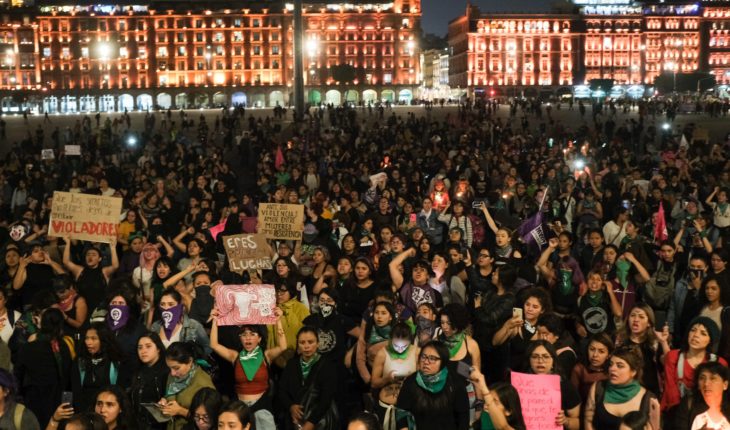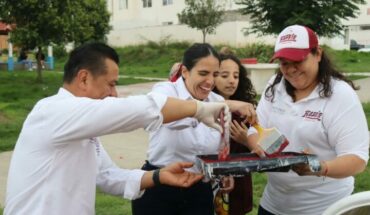In a country where there are almost 10 femicides a day, thousands of women raised their voices this 25N International Day of Elimination of Violence against Women, “because none of them should have died, because none more should die,” the feminist collectives said in the temple of the Zocalo of Mexico City, where they came after marching from the Angel of Independence.
At the forefront of the demonstration walked the mothers of victims of femicide, disappearance and even institutional violence. They were reserved, as in all the latest anti-gender violence marches, the right to walk in the front row. A little behind them were the only men allowed in the march, the parents of those same victims.
No other man was able to occupy the protest space that women defended as their own, even with beatings, so they took out some who insisted on being. The same female policemen asked male journalists to leave the march to avoid confrontations. Reform was supposed to be only a feminist this afternoon of 25N and it was.
Read: #25N March: Women Protest Sexist Violence and Femicide
Mothers’ voices repeated the same painful story: the murdered daughter, the late and clumsy investigation of the authorities, the revictimization.
“My daughter was killed in the early hours and they wanted to make me believe, they hinted that it was her fault for walking in the street at night, that it was my fault, as a mother, for letting her out at that hour. It’s never the fault of the man who murders, it’s never the fault of the police who protect us,” said Lilia Florencio Guerrero, mother of Diana Velázquez.
Diana was murdered on July 2, 2017. She was raped, strangled and dumped into a blackwater channel in Chimalhuacán. “At first, the police told us that she had fallen into the canal herself, then what she did at night outside her house. We had to fight to be typed as femicide, but it’s already two years and there are no results in the investigation.”
Diana’s story has been repeated thousands of times in Mexico in recent years and mothers have walked indignantly, seeking justice.
“We are fed up, we are fed up with sexual harassment at UNAM, at UAM, in Poli, in all educational institutions; in companies, by bosses and by colleagues; in the houses for the couples,” said Wendy Ortiz, an architecture student, one of the participants.
Find out: Nearly 3,000 women are murdered in Mexico in 2019; only 726 are investigated as femicides
In most of the march, the slogans reflected that anger at sexist violence in the public and private space. Women, most of them young, shouted that their body is theirs, their seldes, and that they decide. And they were there marching so they could keep doing it, but also the ones they couldn’t decide.
For moments, groups of hooded youths, armed with hammers and spray took the scene. They broke the glass of the Hamburg metrobus station, and the atmosphere tightened. The mothers of the victims called for no violence. “We want peace, ” they shouted.
The thousands of female policemen, some 2 thousand 500, stationed on both sides of the central lane of Reforma, through which the march was progressing, organized to protect the rest of the stations, forming human belts with their bodies and shields. By then, the peace belt of mexican city government employees had disappeared.
The uniforms advanced to win the protesters the pass and take position on the side of the street. At times it was obvious that they were close to the march in their eagerness to protect monuments, businesses, parabuses, display cases. Not every time they made it, the hooded hammers and their blows overcame two of the fences that were placed to protect the Palace of Fine Arts.
At that point the firecrackers and Molotov bombs flew on the side of the women who covered their faces, but the cops managed to prevent them from entering Fine Arts.
Radical feminist groups passed at the forefront of the march throughout the journey. Hooded women dressed in black broke newspaper stall advertising exhibitors as they passed juarez Avenue, while the rest cheered and clapped.
Policemen forming fences in front of the contingent in some cases prevented protesters from painting at the Monuments of Paseo de la Reforma surrounding them and shouting “forward, advance.”
On her stint on 5 may, groups of women traders in the area supported the march with applause and shouts of “you are not alone, you are not alone.”
Upon arriving at the Zocalo, bank policemen guarded the door of the Cathedral, while the female policemen continued with the human fences at the pass of the march and others clustered in the arches of buildings and shops on the banks of the Zocalo plate.
Meanwhile, the gate of the National Palace was guarded with woods and military throughout the building.
Nevertheless, the real vanguard of the march, the bulk of those who went with a legitimate demand, arrived in the Zocalo peacefully and from the temple various pronouncements were read. Again it was the mothers, the fathers, who were given the microphone for the first demands of justice.
“We come to exhibit them, to demand justice, in Baja California Sur there are femicides, disappearances, women thrown in the street with a gunshot in the head, and the government says they are isolated cases,” the father of a young woman killed in that state.
“We do not forget or forgive the 10 daily femicides in the country, because none of them should have died, none more should die, national emergency, companions, for us and for those who come, for our girls, we want a life without violence,” the spokesmen of the Independent Autonomous Feminist Assembly and the Metropolitan Feminist Assembly pointed out.
While the 8M movement noted that violence against women has not eased with the new federal administration, “that is why we are demanding from the government answers, justice for every case of femicide, effective measures that eradicate gender-based violence, that abortion be legalized across the country, and that women imprisoned for abortion be released.”
Similar demands and testimonies followed for more than an hour, pending the need to do something to stop violence against women, which is already, according to the participants, a national emergency.
With information from Nayelli Roldán.
What we do in Animal Político requires professional journalists, teamwork, dialogue with readers and something very important: independence. You can help us keep going. Be part of the team.
Subscribe to Animal Politician, receive benefits and support free journalism.#YoSoyAnimal
translated from Spanish: Women call for action against gender-based violence at the 25N march
November 26, 2019 |





